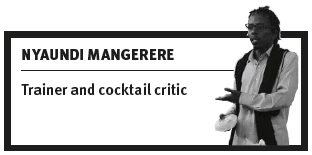
A view from the city: Nairobi
Hamish Smith speaks to trainer and cocktail critic Nyaundi Mangerere
IN NAIROBI, KENYA, THE BARS THAT opened after 1964 and Kenyan independence were mostly serving beer and whisky. There were no cocktails until the late ’90s when the resurgence of nightlife saw them become part of the guest experience. Restaurants such as the Carnivore popularised the now famous Dawa, an amazing and authentic local cocktail. 
Traditional serves such as G&T helped make way for cocktail appreciation.
The new growth of the middle income group and exposure to cocktails are contributing a lot of profit to restaurants.
We have seen significant change with the new lounges coming up in Nairobi and spirits companies offering bartender education and competitions.
Currently we have semi-cocktail bars as most bars tend to offer a range of spirits. But we also have bars that have started to specialise in craft cocktails based on their spirit offerings. Here are my top five:
Fonda restaurant is a new entrant in the market and specialises in tequila cocktails. It has raised the bar on what tequila cocktails are and should be .
The Tav has been around for a couple of years with a whisky selection and cocktail bar that’s only matched by top end hotel bars. It has become a popular spot for whisky lovers seeking a fun crowd and great cuisine.
Since its foundation the champagne bar at Sankara has offered a great array of champagne and striven to introduce the public to the luxury of the wine and a different experience to cocktails in Nairobi.
The bar at Carnivore restaurant is a delight to visit with its barbecue and African music.
Havana bar at Diani beach has opened the public to understanding the beauty of cocktails and offering a greater customer experience.
However, my ultimate go-to bar is J’s, which offers great food and cocktails as well as an amazing guest experience.
Essentially the type of bars around Nairobi are lounges that offer a selected array of spirits. However there has been steady growth, and I believe there is more room for investors to invest in artisan bars to grow cocktail culture.
An interest in higher-end spirits has been around for the past year and we see Glenfiddich, Tullamore Dew, Moët & Chandon and Herradura tequila taking space in the market.
The one thing that you should expect is that the appreciation for great spirits is high.
We are expecting to see more craft cocktails, with companies offering training to bartenders and them showcasing their cocktails online.
This year expect more cocktails around rum, tequila and gin to be created as whisky remains key.
Different bars have been pushing their bartenders to weigh up the balance between local products and international products.
Cocktails, for example, are driven by great spirits and fruits or herbs that are locally sourced from organic farmers.
Quality has been driven by spirits such as Tusker cider and Chrome vodka that feature predominantly in the bars. It is important to note that this year the sector has started to gain interest from distillers as far away as South Africa that are looking to enter the market.
Bartenders here take inspiration mainly from South Africa, Dubai and the US. They give room to bartenders to get inspired and create more. One of the key challenges, I believe, is the lack of awareness of competitions that promote bartenders and raise awareness of the amazing array of cocktails here.
This is coupled with the lack of funding for bartenders to participate in further training outside that brings awareness of the different spirit brands and what they offer in terms of promoting industry-wide programmes.
However, with all this it’s great to note that Nairobi serves as an entry to the East African market. This keeps the bartenders of Nairobi on a constant path of improvement.
